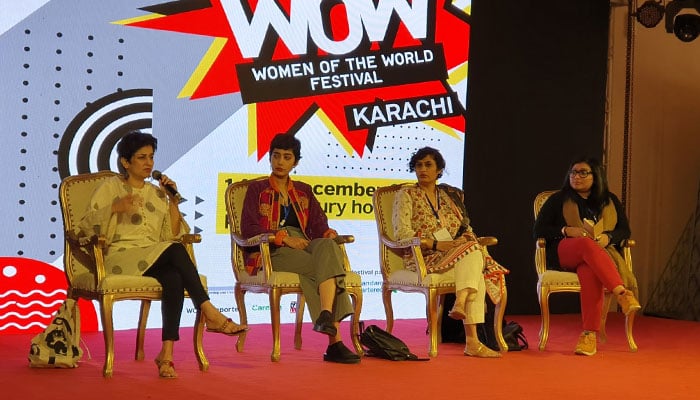Digital feminism: The internet as a safe haven for women
December 15, 2019

With the high-tech advancements and the augmentation of new media into our routine spheres of life, it has become increasingly easier for the escalation of movements and activism to become a part of the everyday narrative and give a voice to the unheard segments of society.
Shedding light on feminism and its growth in digital spaces, acclaimed journalist Sabahat Zakariya sat down with some of the fiercest women in the country from varying walks of life: Famed actor and model Eman Suleman, lawyer and internet activist Nighat Dad and researcher Sadaf Khan.
The esteemed panelists went in depth on the discourse sparked on gender owing to the space that is now easily more consumed by women in spreading the counter-narrative towards the society’s most toxic ideas.
Zakariya began the talk by highlighting how digital spaces have given birth to secluded and safer communities for women where they express their everyday ordeals ranging from domestic traumas to harassment in the workplace and how other women are able to reach out to them through a guarded platform.
Khan added to the narrative by sharing how the discourse encircling gender had been limited in electronic and print media.
“What digital has mostly done is to make this an interactive discourse and because of that a lot of notions regarding what feminism actually is. In Pakistan the understanding of feminism was already quite challenged,” she said.
She further highlighted how digital spaces challenge regressive mindsets present in populist cultures that are given space in literature and fiction.
“If you look back at the internet seven to eight years back then you will find a very masculine internet and when I started working all technological things were mostly handed to men and that is why we saw a rise in the narrative of men. Even on televisions now we see more of male political analysts, even sports is entirely disassociated with women for some reason and if you’re in the media, most of the softer beats are handed over to women,” she said.
“And this is what we saw in online spaces as well. The serious topics they are all being led by men but over the years we also saw that women are also contributing to these topics that are mostly considered masculine,” Dad added.
“Recently we have seen marches that are happening across Pakistan there is Aurat March, Student Solidarity March, Climate March so people are organizing online but also offline,” she added.
Eman Suleman, on the other hand, while acknowledging the progress, admitted that there is a long way to go, keeping in mind the numerous hurdles that come in the way in the form of abuses: “There is progress but this is just the beginning. The problem that I have is that usually the feminist conversations are hijacked by really stupid arguments like ‘yeh yahoodi saazish hai’ or ‘feminism is cancer’. So I think even now there is a need to explain things to people, even now the labour of feminists is very tough.”
Suleman further highlighted how digital spaces are mostly open to women hailing from affluent backgrounds whereas those affected by patriarchy the most still have little to no access to the online world. “We need to move beyond this division. There is a lot of work to do in that regards.”
Further on the subject of opinions expressed online, Suleman reiterated how they help in building a community and for those in need of help to find allies they can trust. Sharing her personal experience, she stated: “When I withdrew from the Lux Style Awards, a lot of other women also did that so when you do that people start to trust you, people want to talk to you. So after this a lot of people started messaging me asking for help. A girl messaged me and she told me that her qaari sahib makes her strip and read the Quran and she doesn’t know what to do. So I reached out to see who could help her.”
“It’s a cathartic experience. They get a direction,” she added.











